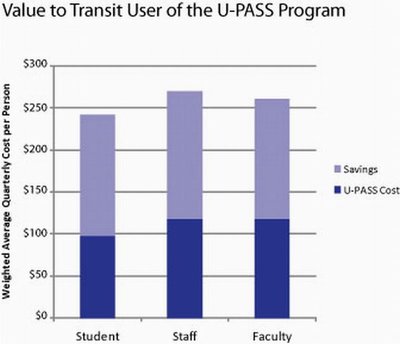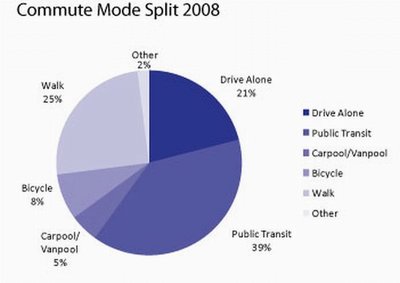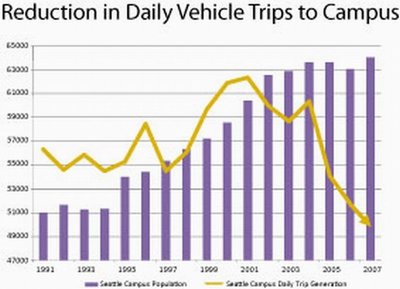In order to continue the U-PASS program in the face of unprecedented transit cost increases, Commuter Services is proposing parking and U-PASS rate changes. Under the proposals, faculty and staff U-PASS rates would increase from $23.37 per month to $40 per month and student rates from $16.67 per month to $33 per month. Single occupancy vehicle permits would increase from $95 per month to $120 per month.
The changes are necessary, according to Commuter Services, because transit costs have increased 79 percent, from $12.4 million in fiscal year 2008 to a projected $22.2 million in fiscal year 2010. This increase in cost results from multiple transit agency fare increases and an estimated jump in ridership of almost 30 percent over that in the last two years.
The University instituted rate increases last year as a partial catch-up, said Josh Kavanagh, director of Transportation Services, but those increases were incomplete. “We intended to make last year’s increase part of a three-step ‘soft landing’ on this issue, but found that it just wasn’t enough and we have to adjust,” he said.
Comments on the proposed rate increases can be made in person at a public hearing from 12:30 to 2:30 p.m., Wednesday, April 22, in 310 HUB.
U-PASS provides the University community with a suite of transportation options at a significant savings, Kavanagh said. If the proposed Seattle campus U-PASS rates are approved, UW faculty and staff will still save from $32 to $121 and students will save from $39 to $138 over what the general public pays for transit passes, depending on their commutes. U-PASS holders are entitled to unlimited rides on King County Metro and Community, Everett, Pierce, Kitsap, and Sound Transit at a fraction of the cost of retail transit passes (see table for fare comparisons).
Increases in parking rates will vary by product. In most cases, the hourly parking rate will remain constant at $3/hr while the daily maximums at campus gatehouses will rise from $12 to $15.
The new rates will make it possible for U-PASS to maintain current services.
Key factors driving the new rates include:
- Metro fare increase: From fiscal year 2008 to fiscal year 2010, Metro fares will have increased an average of 45 percent, in large part due to a sharp drop in state sales tax revenue. Fares charged by many of the University’s other transit partners have also increased. Total transit costs increased from $12.4 million in 2008 to $15.8 million in 2009 and an expected $22.2 million in 2010.
- Metro ridership increase: The cost of fuel and other factors are encouraging more people to ride the bus more often. UW’s transit trips are expected to increase by nearly 30 percent from 2008 to 2010. U-PASS holders pay per quarter for unlimited rides. However, Commuter Services pays transit agencies for each trip taken, so increased ridership increases U-PASS transit costs.
- Parking tax: First introduced in 2008 at 5 percent, the city parking tax has increased to 7.5 percent in 2009, and is slated to be 10 percent or more beginning July 1.
- Infrastructure: New debt for construction needed to maintain existing parking facilities and mitigate loss of parking due to campus construction.
The average person might think that increased ridership means more profit for transit companies, but transit in Washington is largely supported by the sales tax, Kavanagh said. “And sales tax revenues are off by some astronomical amount.”
The parking tax imposed by the city has also caused problems, because it is levied on fees paid at parking facilities such as those the University has rather than on parking spaces provided. Therefore, the University must pay these taxes, whereas a facility such as Northgate Mall, with its free parking, does not have to pay.
Together, U-PASS and Commuter Services are still low cost options for unlimited transit and ridesharing, compared to what students, faculty and staff would have to pay if they were buying passes directly from transit companies, Kavanagh said.
The programs also support bicycling and walking, and manage campus parking resources. The combined impact of these programs allows fewer than 12,000 parking stalls to serve the entire UW community and meet the University’s regulatory obligations to the City of Seattle and the State of Washington. UW commuters who must drive have a range of flexible parking options.
U-PASS options have made it possible for almost 80 percent of the campus population to commute using a mode other than driving alone. The resulting decreases in CO2 emissions and traffic congestion make the UW a part of the solution–creating a more livable and sustainable environment. Despite a 28 percent increase in the campus population since the creation of U-PASS, there were fewer vehicle trips to campus per day in 2007 than in any of the previous 25 years.
“We are negotiating with the transit agencies and talking to the city about the unintended consequences of the parking tax,” Kavanagh said, “but If we are to continue the U-PASS program, there really is no alternative to raising rates.”
A full rate table is available at http://uwcommute.com/rates.
Commuter Services encourages the campus community to share observations and concerns with them. In addition to the hearing, people can comment via an online form on their Web site that enters comments directly into the record of public comment. Go to http://www.washington.edu/commuterservices//parking/fee_survey/index.php
Key Rates Changes |
|
| Cost per Paycheck | Increase | Increase |
U-PASS | |||||
Fac/Staff | $120 | $40 | $20 | $50 | $8.36 |
Student | $99 | $33 | N/A | $49 | N/A |
Parking | |||||
SOV | $360 | $120 | $60 | $75 | $12.50 |
Motorcycle | $120 | $40 | $20 | $25 | $4.16 |
Carpool (requires U-PASS) Per vehicle | $61.20 | $20.40 | $10.20 | 0 | 0 |
Comparison with Regional Transit Passes | Price per month | Proposed price |
U-PASS | ||
Unlimited rides on Metro, Community Transit, Sound Transit, Kitsap Transit, Pierce Transit, Everett Transit and Sounder Rail | $23.33 $16.67 | $40 fac/staff |
Metro Pass | ||
$2.00 face value (will go to $2.25 by January 2010) | $72 | $81 (Jan 2010) |
$2.50 face value | $90 | $99 (Jan 2010) |
Community Transit Pass | ||
$3.00 face value | $108 | |
$4.50 face value | $162 | |
Sound Transit | ||
$3.00 face value (bus only) | $108 | |
$3.25 face value (rail) | $117 | |
$4.75 face value (bus/rail) | $171 | |
Kitsap Transit | ||
Unlimited rides on Kitsap Transit buses | $50 | |
Pierce Transit | ||
$1.75 face value | $63 | |
Everett Transit | ||
Unlimited rides on Everett Transit buses | $18 |


